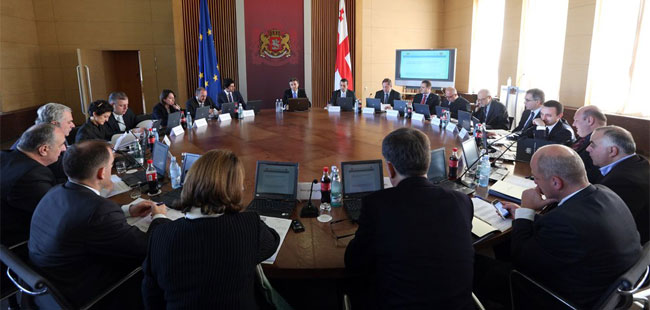
Georgian Dream Government Not Coping with Economy’s Slump
Publication: Eurasia Daily Monitor Volume: 10 Issue: 144
By:

Data just released by Georgia’s state agency for statistics (GeoStat) show a pronounced economic downturn. The robust growth that Georgia was experiencing until the October 2012 elections has petered out following the regime change. In June 2013, the economy contracted for the first time since the 2008 Russian invasion.
Georgia’s GDP had grown at annual rates of some 9 percent prior to that invasion. It rebounded afterward, growing at an average annual rate of 7 percent from 2010 to mid-2012. But the growth rate has plummeted to 2.4 percent in the first quarter of 2013, and to 1.3 percent in the second quarter, including a contraction of minus 0.8 percent in June (GeoStat and IMF figures cited by Civil Georgia, August 1).
Prime Minister Bidzina Ivanishvili hosted an emergency meeting of government ministers with Georgian economic experts on July 26. Such a meeting had long been awaited, and experts welcomed the fact that it was finally held. According to press accounts, participants noted the absence of significant investment projects in Georgia. The government decided to hold additional meetings with experts and to “work out an economic strategy for Georgia” for possible public presentation by September (Rezonansi, July 27; Sakartvelos Respublika, August 1).
The Chairman of Parliament Davit Usupashvili (whose Republican Party is in the governing coalition) blames the deteriorating economic situation mainly on dysfunctional governance. He went on television to criticize the government in toto for its chaotic debates and slow decision-making. The government, he complained, would “discuss one and the same issue multiple times, without taking any decision at all.” According to Usupashvili, the decision-making process of President Mikheil Saakashvili’s government (when Usupashvili was in the opposition) was far more effective, compared with the present government’s. He complained that this government’s inaction, as well as legal and political disputes, damage business confidence and discourage investment. He criticized the present government for spending “too much time, too much energy” on settling scores with the former government, instead of attending to the economy and focusing on the future (Channel 9 TV cited by Civil Georgia, August 1).
First as a candidate and then as prime minister, Ivanishvili has spoken about combining some of his own money with that of foreign investors into multi-billion dollar investment funds for Georgia. He has variously talked about an agriculture fund and a diversified “investment partnership fund” (target figure $10 billion, according to Ivanishvili’s interview with EUobsever, July 29). The government has not announced any specifics and is not known to have taken any implementing steps on the investment funds. The drying up of investment predetermines higher unemployment. Along with this trend, however, inflation is turning into deflation and has already led to lower food prices.
Ivanishvili’s and Georgian Dream’s popularity ratings are declining (see EDM, July 24) in step with the economic downturn. The expectations aroused by Ivanishvili’s wealth and his populist electoral campaign are turning into disappointment among a growing number of voters. Nevertheless, the government still enjoys a considerable margin of political safety at least for the time being. Its declining ratings are still way out of reach to the opposition United National Movement (UNM). The presidential election campaign will probably narrow the gap to some extent by October. But Georgian Dream’s majority in parliament and in the electorate looks unassailable for the remainder of this legislative period, provided that the coalition holds together around Ivanishvili.
Moreover, a direct correlation does not necessarily operate between a government’s economic performance and its electoral performance or popularity in Georgia. That presumed correlation was disproved in the 2012 parliamentary elections. The UNM lost the elections in every city and district that had benefited from targeted investment and accelerated development. Conversely, UNM won those elections in the districts that had experienced relative neglect in those respects. The UNM had, in part, used up its popularity, and to a significant extent provoked an anti-liberal backlash from tradition-bound social strata. Ivanishvili and most of the Georgian Dream coalition, however, are catering to those strata.
Ivanishvili continues invoking a pre-term resignation from government, and has now moved forward his putative resignation date to the end of the current year (see EDM, August 2). This warning may not yet, or not fully, be taken at face value, but Georgian Dream and the smaller allied parties are worried that the coalition may fall apart if Ivanishvili quits government and politics. All six coalition parties are in the parliament on Ivanishvili’s coattails, with meager resources of their own. Georgian observers across party lines commonly assume that the Georgian Dream parties’ electoral potential directly depends on Ivanishvili. Coalition politicians and commentators linked to them are urging Ivanishvili to change his mind and stay on as prime minister (Rezonansi, July 26, 27; Civil Georgia, Interpress, www.georgianews.ge, 24 Saati, August 1).
Meanwhile, the Georgian Dream parliamentary majority has initiated constitutional amendments that would curtail the prime minister’s powers while enlarging those of parliament. The previous, UNM-dominated parliament had curtailed the president’s powers while enlarging those of the prime minister through constitutional amendments adopted in 2010. Only three years later, the Constitution is being changed again, adding to the political uncertainties. The proposed curtailing of the prime minister’s powers may be taken as a sign that Ivanishvili might move from that official position into one of informal, wealth-based political leadership.




